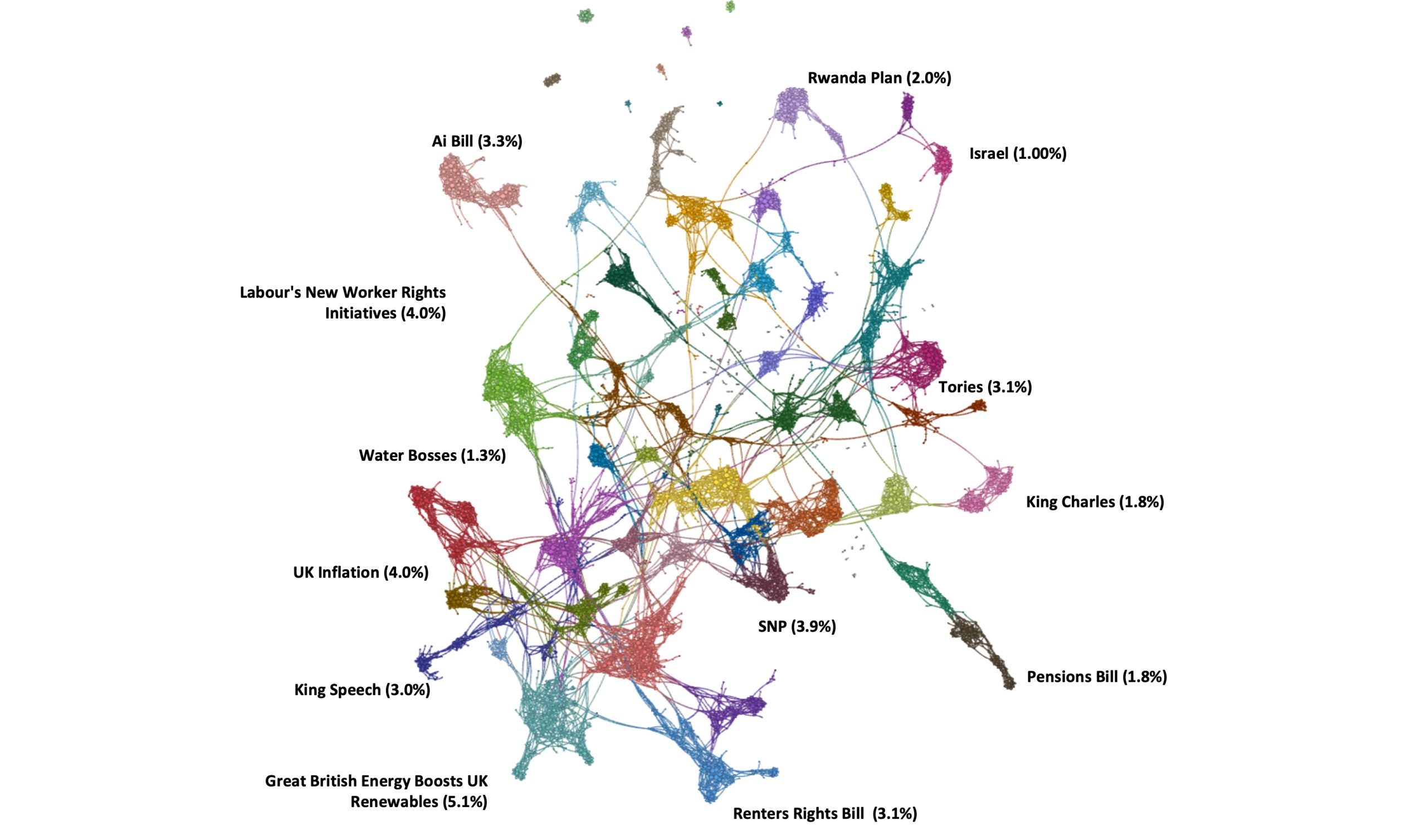2024: A transformative year for global economies and technology
2024 is set to be a historic year for global democracy, marked by pivotal elections and political shifts worldwide. Elections are taking place in over 50 countries this year, impacting nearly half of the planet’s population. This will have a transformative impact on the global tech landscape, with governments around the world looking to leverage technology to drive forward policy and fuel economic growth.
In the UK, labour recently took the helm after 14 years of conservative rule, embarking on a mission of “national renewal”. With its promise to harness new technologies and kick-start economic growth, the new Government is poised to reshape the technology landscape.
This emphasis on economic growth was a cornerstone of The King’s Speech, which outlined Labour’s legislative agenda comprising 40 new Bills. Although AI was notably missing from the Speech, subsequent developments including the recently announced AI Opportunities Action Plan and reassurance of an AI Bill to come, signal change on the horizon.
Here we unpack what this means for tech and adjacent industries.
Harnessing the power of data for economic growth
The King’s Speech saw two technology-specific pieces of legislation. The first, was the Digital Information and Smart Data Bill which will seek to reform data regulations and enhance how digital information is managed and utilised. The Government intends to “harness the power of data for economic growth, to support a modern digital government, and to improve people’s lives”.
Sitting alongside this, we’ll see the introduction of Smart Data schemes allowing for the secure sharing of customers’ data upon their request, with authorised third-party providers. It focuses on improving data accessibility and interoperability, promoting the use of smart data for innovation and economic growth, while adhering to robust data protection standards and cultivating trust in digital ecosystems. The Smart Data scheme, which the Government likens to Open Banking, is a welcome move for the FinTech sector in particular. After the Data Protection and Digital Information (DPDI) Bill failed to pass and receive royal assent during Parliament’s wash-up period, there was concern that the delay would threaten the UK’s position as a global FinTech leader. The introduction of the Digital Information and Smart Data Bill however, is expected to create new opportunities for the FinTech industry by facilitating the development of innovative products and services. This will also boost consumer confidence in the underlying technologies, through strong data protection measures and greater transparency in how their data is used.
Bolstering national cyber defense and security
The second bill directly aimed at the technology sector is the Cyber Security Resilience Bill. This aims to bolster the UK’s defenses against cyber threats by establishing stronger security requirements for critical infrastructure and key sectors. It focuses on improving the resilience of digital systems, mandating regular security assessments, and improving incident response and recovery processes. The Bill also seeks to strengthen collaboration between public and private sectors on cybersecurity matters and increase transparency and accountability for managing cyber risks, ensuring organisations can better protect against, detect, and respond to cyberattacks.
Further notable Bills:
Many other Bills in motion will have an influence on the technology sector.
- The English Devolution Bill: This would give new powers to metro mayors and combined authorities, supporting local growth plans which bring economic benefits to communities. This could create new opportunities for tech companies outside of traditional hubs like London.
- Employment Rights Bill: Aims to ban zero-hour contracts and strengthen workers’ rights, which could affect tech companies’ hiring practices and workforce management.
- The Skills England Bill: This would see the creation of the body ‘Skills England’, comprised of businesses, education providers, unions and policy makers to tackle the UK skills gap. This could be significant for plugging digital talent gaps.
- Product Safety and Metrology Bill: Designed to enhance product safety standards and ensure accurate measurement practices. The Bill aims to provide powers for effective regulation of high-risk products, specifically mentioning AI, e-bikes, and lithium-ion batteries, which could directly affect companies developing or using these technologies.
- The Planning and Infrastructure Bill: This Bill sets out to streamline the process for critical infrastructure development, which could accelerate the roll out of 5G networks and other digital infrastructure projects.
- National Wealth Fund: The establishment of a National Wealth Fund could create new investment opportunities for tech start-ups and scale-ups.
- Great British Energy Bill: This Bill, with an initial £8.3 billion investment, aims to boost renewable energy deployment and innovation in technologies like hydrogen and carbon capture.
A missed opportunity for AI
Rumours of an AI Bill swirled in the lead up to the King’s Speech, with the Financial Times reporting that the Bill would “seek to enhance the legal safeguards surrounding the most cutting-edge AI technologies”, focusing on legislating the production of large language models (LLMs). However, while there was a fleeting mention of the Government’s plans to regulate the technology with the promise to “seek to establish the appropriate legislation to place requirements on those working to develop the most powerful artificial intelligence models”, a dedicated AI Bill was not announced.
This was met by considerable surprise and in some cases disappointment from figures across various industries. With the EU making significant strides with the reveal of the AI Act in May, many expected the UK’s new Government to grab this opportunity to match the EU’s efforts and boldly set out intentions.
The anticipation of an AI Bill is evident in our media analysis of coverage around the King’s Speech. The Quid Map below shows clusters of key topics driving media conversations during this period, with the AI Bill having a notable media presence against the backdrop of a broad political agenda.

Quid analysis of media topics relating to The King’s Speech – July 2024
The omission of an AI Bill, however, does not signal a lack of intent from the Labour Government. It likely reflected the need for further deliberation in order to create a considered and comprehensive framework that stands to rival the EU as the precent-setting approach for regulating AI.
Labour has been quick to follow-up with reassurance that an AI Bill is indeed coming and should be expected later this year. The Financial Times reported that the Bill, which Labour promises will not become a “Christmas tree bill”, is going to focus exclusively on two things: making existing voluntary agreements between companies and the Government legally binding, and turning the UK’s new AI Safety Institute into an arm’s length Government body. A consultation on the contents of the Bill is expected to launch within the coming weeks and should last for a couple of months.
Labour appears to be taking a more stringent approach to regulating AI than the Conservatives, and it will be interesting to see how this compares with efforts from their predecessors over the last 12 months.
Although the Conservative Government did not introduce AI legislation during their time in power, they sought to position the UK as a leader in AI regulation with its inaugural Global AI Summit at Bletchley Park in November 2023. Six months later, the UK joined forces with the Republic of Korea to host a follow-up AI Summit in Seoul, where the UK – alongside 26 other nations – agreed to develop shared risk thresholds for frontier development and deployment to help pave the way for global AI safety standards. The nations have set the ambitious target of developing the proposals alongside AI technology companies, civil society, and academia for discussion ahead of the AI Action Summit, due to be hosted by France in February 2025. In the lead up to this Summit, all eyes will be on the UK Government to show how it’s delivering against its promises. The Summit serves as a critical milestone for progress; any delays could damage public perception of AI and the nation’s ability to protect end-users, potentially hindering the successful implementation of AI technologies.
Labour has clearly stated its intention to leverage AI to drive economic growth, but we’ve yet to see the investments and funding necessary to make this vision a reality. Last week, just days after the new AI Opportunities Action Plan was announced, the BBC revealed that Labour has shelved £1.3bn of funding for tech and AI projects promised by the Conservatives. This includes £800m for the creation of an exascale supercomputer and a further £500m for AI Research Resource, which funds computing power for AI. Sue Daley, Director of Technology and Innovation at techUK, warned that “in an extremely competitive global environment, the government needs to come forward with new proposals quickly. Otherwise, we will lose out against our peers”.
Tailoring communications
With an ambitious legislative agenda laid out, businesses need to keep abreast of the relevant policies that will impact them and evolve their communications strategy accordingly. The devil will be in the detail.
As the Government is not required to deliver these Bills within this Parliamentary Session, many could take years to be implemented. Ironically, narrow AI regulation – albeit absent from the Speech – is likely an immediate priority for the Labour Government and we can expect some form of guidance within the coming months.
Whether your business is actively involved in the development of AI, or even if AI is being deployed across your organisation, you should consider and reassess your AI communications strategy – both internally and externally – to demonstrate to stakeholders that you are well positioned and equipped to navigate this new era of technology.
For guidance on how your business can develop its communications strategy in accordance with frontier technology and the associated policy changes, feel free to reach out to us here.
